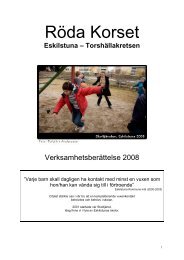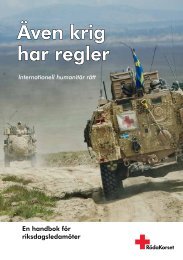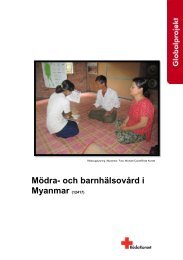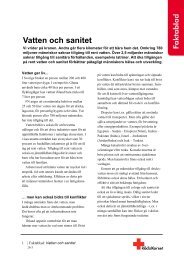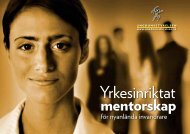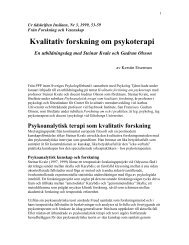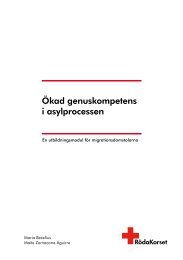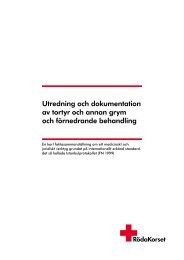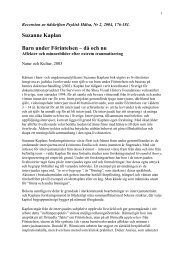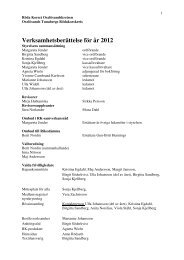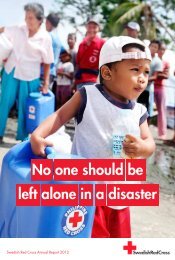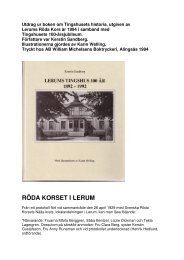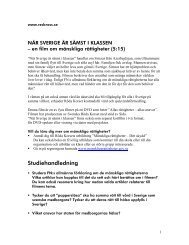chapter 4 - DRK
chapter 4 - DRK
chapter 4 - DRK
Create successful ePaper yourself
Turn your PDF publications into a flip-book with our unique Google optimized e-Paper software.
Strictly under embargo until Wednesday 22 September at 00:01 GMT (02:01 Geneva time)human rights standards and humanitarian principlesinto their work.The IFRC promotes the Youth as Agents ofBehavioural Change programme, which inviteschildren to participate in role-playing games orvisualization exercises and then discuss their emotions.For example, a group forms a circle andprevents others from breaking through, a gamethat teaches empathy for excluded immigrants.The games are an instinctive, non-cognitiveway to learn compassion, active listening, criticalthinking, non-judgement, mediation and apeaceful resolution of tensions. Games andexercises are adapted to meet the needs andchallenges of each national context and peereducation is essential. “The programme is aboutchanging mindsets, attitudes and behaviour ina society and how youth can play a leadershiprole in that,” said IFRC’s Katrien Beeckman, whofounded the programme. The future of urban violenceAt best, however, these strategies can only hope to lessen the impact of violence in thetargeted communities. This is not to deny the important progress that has been madethrough community-centred approaches and development initiatives. For example, theadoption of targeted social programmes that deal directly with the problem of poverty,such as the Benazir Bhutto Income Support Programme in Pakistan, Progresiva in Mexicoor Bolsa Familia in Brazil and other conditional cash transfer schemes, have helped reduceincome inequality in targeted communities. But these gains are threatened by globaleconomic conditions, ageing populations and the failure to extend the benefits throughreforms that improve the quality and reach of health and education services nationally. Forexample, while developed countries regularly spend up to 18 per cent of total governmentexpenditure on health, Kenya spends only 6.1 per cent, Jamaica barely 4.2 per cent andPakistan a paltry 1.3 per cent. And while important progress has been made in the numberof children attending primary and secondary school education, the quality is oftenappalling. In Brazil where 70.4 per cent of the population is qualified as ‘low educationattainment’ in the UN Development Programme’s 2009 Human Development Index, aquarter of the education budget is spent on free university education while primary andsecondary education is neglected. In parts of Pakistan, the female literacy rate is 3 per cent.Regardless of how sophisticated the economic models used to develop governmentstrategies to cushion the effects of economic crisis and support income redistributionare, no amount of social spending or development programming innovations will beable to withstand the corrosive impact of corruption or to resist being derailed by elitegroups if the political system does not establish equality before the law. The principlethat the law of the land should apply equally to all is a cornerstone of a free societyand one which is often markedly absent in countries where urban violence is rife. Thediscretionary application of tax codes, zoning laws, public procurement and contractingregulations, criteria for public appointments, restrictions on the exploitation ofnatural resources and even court rulings, benefits the few and establishes a neo-feudalhierarchy of elite groups, special interests and favoured individuals, creating one of themost powerful incentives for widespread crime and violence. International assistance88



